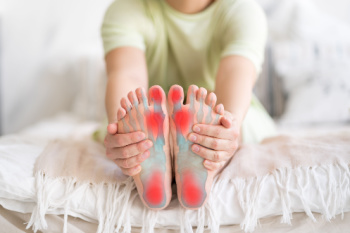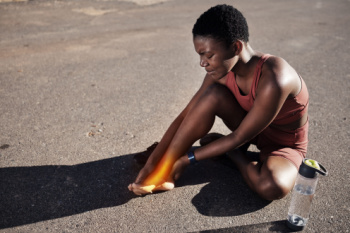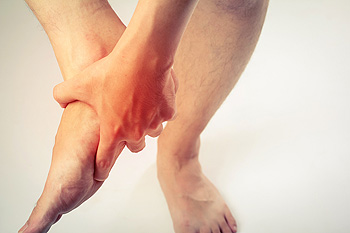Connect With Us
Blog
Items filtered by date: November 2024
Foot Care Tips for Rheumatoid Arthritis Patients

For those with rheumatoid arthritis, or RA, proper foot care is essential to manage pain and prevent mobility issues. RA often affects the joints in the feet, causing swelling, stiffness, and pain that can worsen without special attention. Consistent and gentle foot exercises help maintain joint flexibility while wearing supportive footwear minimizes stress on sensitive areas. Look for shoes with cushioned soles, wide toe boxes, and arch support to ease pressure on joints. Daily inspection of the feet is important for spotting redness, sores, or deformities early, as RA can make skin and nails more prone to damage. Applying moisturizer helps prevent dry skin and cracks. If you have RA and have pain or deformities like bunions that worsen, it is suggested that you schedule an appointment with a podiatrist who can recommend custom orthotics or special footwear adjustments, providing relief and improving mobility.
Because RA affects more than just your joints, including the joints in your feet and ankles, it is important to seek early diagnosis from your podiatrist if you feel like the pain in your feet might be caused by RA. For more information, contact Wendy L. Grossman, DPM of New Jersey. Our doctor will assist you with all of your podiatric concerns.
What Is Rheumatoid Arthritis?
Rheumatoid Arthritis (RA) is an autoimmune disorder in which the body’s own immune system attacks the membranes surrounding the joints. Inflammation of the lining and eventually the destruction of the joint’s cartilage and bone occur, causing severe pain and immobility.
Rheumatoid Arthritis of the Feet
Although RA usually attacks multiple bones and joints throughout the entire body, almost 90 percent of cases result in pain in the foot or ankle area.
Symptoms
- Swelling and pain in the feet
- Stiffness in the feet
- Pain on the ball or sole of feet
- Joint shift and deformation
Diagnosis
Quick diagnosis of RA in the feet is important so that the podiatrist can treat the area effectively. Your doctor will ask you about your medical history, occupation, and lifestyle to determine the origin of the condition. Rheumatoid Factor tests help to determine if someone is affected by the disease.
If you have any questions please feel free to contact our office located in Bloomfield, NJ . We offer the newest diagnostic and treatment technologies for all your foot and ankle needs.
Jogger’s Foot Treatment

Jogger’s foot, or medial plantar neuropathy, is a condition caused by the entrapment of the medial plantar nerve, often affecting runners and individuals engaged in repetitive foot-striking activities. Characterized by pain, tingling, or numbness along the inside of the arch and the sole, this condition can mimic other foot ailments, making diagnosis challenging. Differentiating jogger’s foot from plantar fasciitis or tibial nerve entrapment is critical, as each requires distinct management strategies. A podiatrist, specializing in foot and ankle care, is equipped to identify medial plantar neuropathy through physical exams, imaging, and nerve conduction studies. Treatment for jogger's foot involves activity modification, orthotics, and targeted exercises. For patients unresponsive to conservative measures, innovative techniques offer potential relief. If you have symptoms of jogger’s foot, it is suggested that you consult a podiatrist for a proper diagnosis and care.
Foot Pain
Foot pain can be extremely painful and debilitating. If you have a foot pain, consult with Wendy L. Grossman, DPM from New Jersey. Our doctor will assess your condition and provide you with quality foot and ankle treatment.
Causes
Foot pain is a very broad condition that could be caused by one or more ailments. The most common include:
- Bunions
- Hammertoes
- Plantar Fasciitis
- Bone Spurs
- Corns
- Tarsal Tunnel Syndrome
- Ingrown Toenails
- Arthritis (such as Gout, Rheumatoid, and Osteoarthritis)
- Flat Feet
- Injury (from stress fractures, broken toe, foot, ankle, Achilles tendon ruptures, and sprains)
- And more
Diagnosis
To figure out the cause of foot pain, podiatrists utilize several different methods. This can range from simple visual inspections and sensation tests to X-rays and MRI scans. Prior medical history, family medical history, and any recent physical traumatic events will all be taken into consideration for a proper diagnosis.
Treatment
Treatment depends upon the cause of the foot pain. Whether it is resting, staying off the foot, or having surgery; podiatrists have a number of treatment options available for foot pain.
If you have any questions, please feel free to contact our office located in Bloomfield, NJ . We offer the newest diagnostic and treatment technologies for all your foot care needs.
Wounds That Don't Heal Need to Be Checked
Caring for Children’s Feet

Children’s feet grow rapidly, with the last foot bone developing about the age of three.This early growth requires gentle care to support healthy development. Parents should select flexible, well-fitted shoes that allow natural movement and avoid restrictive footwear, which can hinder proper bone and muscle development. Barefoot play on safe surfaces is also beneficial, as it helps strengthen the foot’s muscles and improve balance. Regularly checking for signs of discomfort or abnormal wear on shoes can highlight early issues. Parents should monitor for symptoms like persistent pain, limping, or visible foot deformities, such as inward-turning feet or flat feet, which may be normal at certain stages but worth watching. If these symptoms persist or worsen, it is suggested that you visit a podiatrist who can assess and guide you on corrective options.
Making sure that your children maintain good foot health is very important as they grow. If you have any questions, contact Wendy L. Grossman, DPM of New Jersey. Our doctor can provide the care you need to keep you pain-free and on your feet.
Keeping Children's Feet Healthy
Having healthy feet during childhood can help prevent medical problems later in life, namely in the back and legs. As children grow, their feet require different types of care. Here are some things to consider...
Although babies do not walk yet, it is still very important to take care of their feet.
Avoid putting tight shoes or socks on his or her feet.
Allow the baby to stretch and kick his or her feet to feel comfortable.
As a toddler, kids are now on the move and begin to develop differently. At this age, toddlers are getting a feel for walking, so don’t be alarmed if your toddler is unsteady or ‘walks funny’.
As your child gets older, it is important to teach them how to take care of their feet.
Show them proper hygiene to prevent infections such as fungus.
Be watchful for any pain or injury.
Have all injuries checked by a doctor as soon as possible.
Comfortable, protective shoes should always be worn, especially at play.
If you have any questions please feel free to contact our office located in Bloomfield, NJ . We offer the newest diagnostic and treatment technologies for all your foot and ankle needs.
More About Plantar Fasciitis

Plantar fasciitis causes sharp heel pain, especially noticeable in the morning or after long periods of sitting. It occurs when the plantar fascia, a thick band of tissue connecting the heel to the toes, becomes inflamed due to excessive strain. Common causes include overuse, flat feet, high arches, and wearing inadequate footwear. Symptoms typically include a stabbing pain at the bottom of the heel, which may improve with movement but worsen with prolonged standing or walking. Treatment options for plantar fasciitis include rest. Custom orthotics and supportive shoes can also provide relief by improving foot mechanics. A podiatrist can offer specialized assessments and tailored treatment plans to address your specific needs. They may suggest targeted exercises or corticosteroid injections for persistent pain. If you are struggling with heel pain, consider making an appointment with a podiatrist to get back on your feet comfortably.
Plantar fasciitis is a common foot condition that is often caused by a strain injury. If you are experiencing heel pain or symptoms of plantar fasciitis, contact Wendy L. Grossman, DPM from New Jersey. Our doctor can provide the care you need to keep you pain-free and on your feet.
What Is Plantar Fasciitis?
Plantar fasciitis is one of the most common causes of heel pain. The plantar fascia is a ligament that connects your heel to the front of your foot. When this ligament becomes inflamed, plantar fasciitis is the result. If you have plantar fasciitis you will have a stabbing pain that usually occurs with your first steps in the morning. As the day progresses and you walk around more, this pain will start to disappear, but it will return after long periods of standing or sitting.
What Causes Plantar Fasciitis?
- Excessive running
- Having high arches in your feet
- Other foot issues such as flat feet
- Pregnancy (due to the sudden weight gain)
- Being on your feet very often
There are some risk factors that may make you more likely to develop plantar fasciitis compared to others. The condition most commonly affects adults between the ages of 40 and 60. It also tends to affect people who are obese because the extra pounds result in extra stress being placed on the plantar fascia.
Prevention
- Take good care of your feet – Wear shoes that have good arch support and heel cushioning.
- Maintain a healthy weight
- If you are a runner, alternate running with other sports that won’t cause heel pain
There are a variety of treatment options available for plantar fasciitis along with the pain that accompanies it. Additionally, physical therapy is a very important component in the treatment process. It is important that you meet with your podiatrist to determine which treatment option is best for you.
If you have any questions, please feel free to contact our office located in Bloomfield, NJ . We offer the newest diagnostic and treatment technologies for all your foot care needs.
Blog Archives
- July 2025
- June 2025
- May 2025
- April 2025
- March 2025
- February 2025
- January 2025
- December 2024
- November 2024
- October 2024
- September 2024
- August 2024
- July 2024
- June 2024
- May 2024
- April 2024
- March 2024
- February 2024
- January 2024
- December 2023
- November 2023
- October 2023
- September 2023
- August 2023
- July 2023
- June 2023
- May 2023
- April 2023
- March 2023
- February 2023
- January 2023
- December 2022
- November 2022
- October 2022
- September 2022

